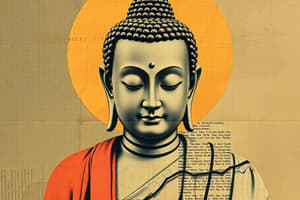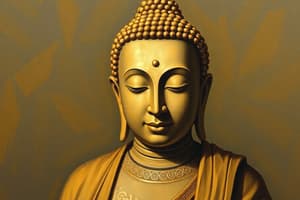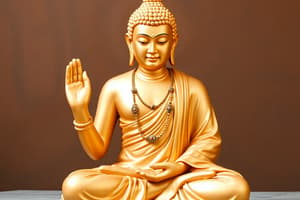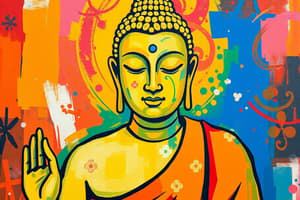Podcast
Questions and Answers
In which century did Buddhism begin according to scholars?
In which century did Buddhism begin according to scholars?
- 8th century BCE
- 6th century BCE (correct)
- 7th century BCE
- 5th century BCE
What was Siddhartha Gautama's social status before he became the Buddha?
What was Siddhartha Gautama's social status before he became the Buddha?
- A religious leader
- A wealthy merchant
- A prince of the warrior caste (correct)
- A commoner
What significant event caused Siddhartha to question his sheltered upbringing?
What significant event caused Siddhartha to question his sheltered upbringing?
- His marriage to a princess
- Seeing a sick man, an aging man, and a dead man (correct)
- A public argument with a monk
- The death of his father
What prophecy was Siddhartha Gautama subjected to regarding his future?
What prophecy was Siddhartha Gautama subjected to regarding his future?
How did Siddhartha's father attempt to influence his destiny?
How did Siddhartha's father attempt to influence his destiny?
What significant realization did Siddhartha come to after practicing extreme asceticism?
What significant realization did Siddhartha come to after practicing extreme asceticism?
What was the location where Siddhartha attained enlightenment?
What was the location where Siddhartha attained enlightenment?
What temptation did Siddhartha face during his meditation?
What temptation did Siddhartha face during his meditation?
What was Buddha's state after achieving enlightenment?
What was Buddha's state after achieving enlightenment?
What did Buddha emphasize in his final teachings to his followers?
What did Buddha emphasize in his final teachings to his followers?
Flashcards are hidden until you start studying
Study Notes
The Rise of Buddhism in Ancient India
- Buddhism originated in India during the 6th century BCE, a period of significant social and political transformation.
- This era witnessed the rise of kingdoms, expanding cities, thriving trade routes, and efforts to shift populations away from rural life.
- Hinduism was the dominant religion at that time.
Siddhartha Gautama: From Prince to Buddha
- Siddhartha Gautama, born around 563 BCE in modern-day Nepal, was a prince of the warrior caste.
- A prophecy foretold he would become either a great political leader or a homeless monk.
- His father shielded him from suffering, ensuring a life of luxury, marriage, and a son.
- Exposure to sickness, old age, death, and a monk shattered Siddhartha's sheltered worldview.
- This confronting experience sparked his quest for understanding the nature of suffering.
The Path to Enlightenment
- Siddhartha abandoned his privileged life to seek answers to existential questions.
- He initially pursued ascetic practices, including extreme self-deprivation, which proved ineffective.
- He achieved enlightenment while meditating under a Bodhi tree in Bodh Gaya, northeastern India.
- Mara, the god of desire and death, tempted him to abandon his quest, but Siddhartha persevered.
- His enlightenment, described as Nirvana, marked a state free from craving and the cycle of rebirth.
The Buddha's Teachings and Legacy
- The Buddha chose to share his understanding to alleviate suffering, leading to the foundation of Buddhism.
- He taught the Middle Way for 45 years, emphasizing a balanced approach avoiding extremes of indulgence and asceticism.
- He died at the age of 80 near Varanasi, India.
- Buddhists believe he achieved parinirvana, a state akin to the Hindu concept of moksha, transcending the cycle of rebirth (samsara).
- His parting words to his followers, "Work out your own liberation with diligence," emphasized the personal nature of spiritual attainment.
Studying That Suits You
Use AI to generate personalized quizzes and flashcards to suit your learning preferences.




